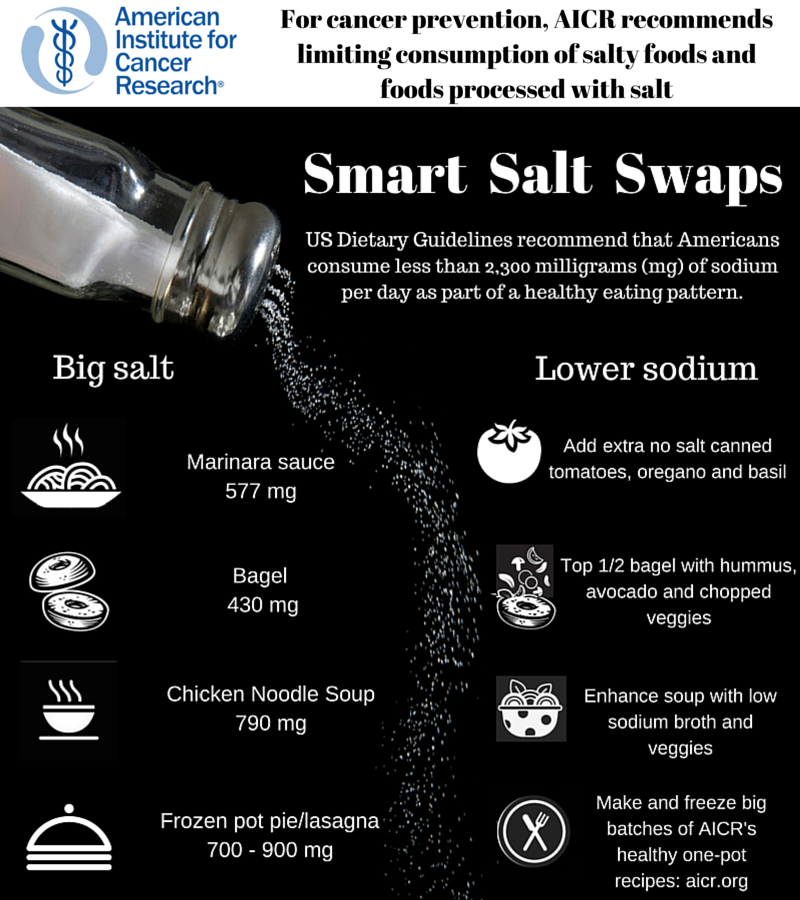If you ate a bagel for breakfast this morning, you’ve already had a big chunk of the maximum amount of sodium you should have for the day. Going beyond that amount is pretty common though. According to a government report earlier this year, nine of ten adults consume more than the recommended amount of dietary sodium – 2,300 milligrams of sodium, which is about one teaspoon.
One of AICR’s recommendations for cancer prevention is to limit how much salt and salty foods you eat. Our report last week found that salt preserved foods commonly eaten in Asia link to increased risk of stomach cancer and although those foods aren’t a staple in the US, Americans’ salt-loving habits lead to other health problems like high blood pressure and increased risk for heart disease and stroke.
A small part of that is the salt you add at the table. Most of your sodium comes from salt already added to foods that you buy.
 You can spot some salty foods pretty easily – snacks like chips, fries and pretzels. But big doses of sodium are hiding in soups, frozen meals, breads and even some desserts. A little salt added to a dish can help bring out a food’s flavor, but the salt is the flavor in some highly processed foods.
You can spot some salty foods pretty easily – snacks like chips, fries and pretzels. But big doses of sodium are hiding in soups, frozen meals, breads and even some desserts. A little salt added to a dish can help bring out a food’s flavor, but the salt is the flavor in some highly processed foods.
Cutting back on sodium isn’t easy because even some healthier convenience meals and dishes are high sodium. If you’re used to salt, food can taste bland without it. You can change your taste so you don’t need so much salt and as you make that transition, there are strategies you can use to combine convenience with less sodium.
- There are more and more reduced sodium convenience options. You can find no salt added canned and frozen beans and vegetables, and soups and frozen meals that are reduced, low or light in sodium.
- Spices, herbs, garlic and onions are excellent flavor enhancers to cut back on salt in your cooking or add interest to low sodium convenience foods.
- To change your taste, gradually cut back your salt in cooking and find easy swaps for some high sodium foods.
- Flavor vegetables and meats with spicy rubs. Try our Roasted Cauliflower or Za’tar Chicken.
- Transition from bottled dressings to simple oil, vinegar and mustard salad dressings. Or try our Cucumber Dill Dressing.
- In soups, stews and other top of stove dishes, gradually cut back on amount of salt you normally add and up the herbs and spices a bit.
Try AICR’s Healthy Recipes to help you find new ways to slash the salt.






“Low Sodium” labeled products are nearly always still loaded with way too much salt. Insisting on “no added salt” products from your grocer is the best strategy.
Does the AICR/WCRF still officially recommend limiting sodium intake to a certain level?
Hi Keith,
By following AICR’s 10 Cancer Prevention Recommendations and eating a plant-based diet like the New American Plate method can help limit sodium intake.
You can try adding different herbs and spices to meals which can enhance flavors of your food and can also help cut back on sodium. Take a look at library of Healthy Recipes.